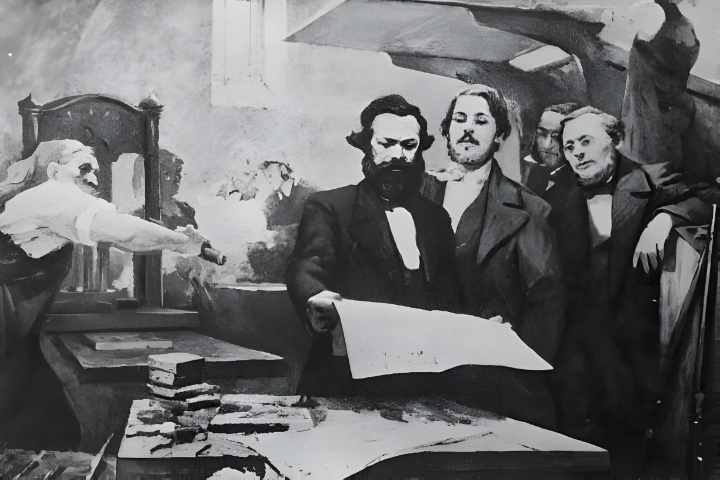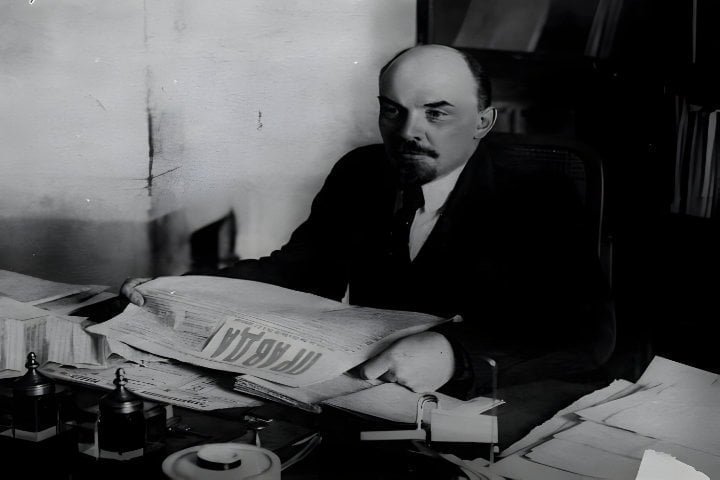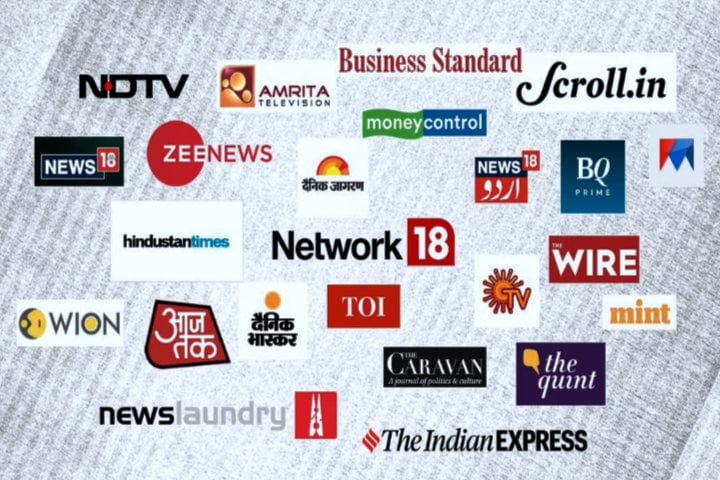Comparative Analysis of Marxist View on Media
[tqb_quiz id=’13563′]
The Marxist view on media offers a critical lens through which to examine the complex relationships between media, power, and society.
This perspective, rooted in Karl Marx’s and subsequent scholars’ theories, provides a framework for analyzing how media systems operate within capitalist societies and their role in shaping public opinion, cultural norms, and social structures.
The Marxist approach to media studies emphasizes the economic foundations of media production, media content’s ideological functions, and the media’s potential to reinforce or challenge existing power dynamics.

| Theorist | Focus of Analysis | View of Media Power | Agency of Audience | Historical Context |
|---|---|---|---|---|
| Marx/Engels | Broad critique of capitalist society, with media as part of the superstructure | Media as a tool of the ruling class | Limited agency, audience is seen as largely passive | 19th-century industrial capitalism |
| Gramsci | Cultural institutions and civil society, including media’s role in hegemony | Media as the site of hegemonic struggle | Some agency in resisting or negotiating hegemony | Early 20th century, the rise of fascism in Europe |
| Althusser | Ideological functions of institutions, including media | Media as an ideological state apparatus | Limited agency, subjects interpellated by ideology | Post-WWII France, structuralist influences |
| Frankfurt School | Cultural industry and its effects on Consciousness | Media as an instrument of mass deception | Audiences are largely manipulated by cultural industry | Nazi Germany and post-war consumer capitalism |
| Williams | Media as cultural practices within material and historical contexts | Media as a complex cultural practice with the potential for resistance | Audience agency within cultural and material constraints | Post-war Britain, the emergence of cultural studies |
| Hall | Production and reception of media messages, representation | Media power negotiated through the encoding/decoding process | The audience actively interprets messages, potential for oppositional readings | Late 20th century, identity politics and multiculturalism |
| Chomsky/Herman | Structural analysis of news media | Media systematically biased toward elite interests | Audience influenced by propagandistic media system | Cold War and post-Cold War media landscape |
| Smythe | Economic aspects of media, audience as a commodity | Media power derived from the commodification of audience attention | Audience labor is exploited, but some agency in consumption choices | Post-war North American media and advertising industries |
Significance of Marxist Media Theory

The Marxist view on media theory offers significant insights into the complex relationships between media, society, and power structures. These viewpoints offer a framework for analyzing power dynamics in media systems, enabling researchers to investigate how media shapes and spreads different ideologies in society.
The Marxist view focuses on the political economy of media, emphasizing the economic structures and interests that support media production. The Marxist view provides a framework for cultural critique, allowing for a detailed analysis of media’s influence on cultural norms and values.
This perspective uses historical materialism to place media analysis in wider historical and social contexts, leading to a better understanding of media phenomena.
The Marxist approach also informs strategies for developing alternative, counter-hegemonic media practices, encouraging the creation of diverse media landscapes. Lastly, the Marxist view on media contributes significantly to media literacy by enhancing critical understanding of media messages and structures.
This aspect empowers individuals to engage with media content more thoughtfully and critically, fostering a more informed and discerning audience. The Marxist Media Theory offers a multifaceted approach to understanding media’s role in society, from its economic foundations to its ideological impacts and potential for social change.
Criticism of Marxist Media Theory

The Marxist view on media, while influential, has faced several criticisms. One major critique is its tendency towards economic determinism, potentially overemphasizing economic factors at the expense of other influences on media systems.
Critics argue that the Marxist approach can sometimes oversimplify complex media processes, reducing them to class struggle or ideological dominance.
Another criticism of the Marxist view is that it may underestimate audience agency, not fully accounting for the audience’s ability to resist or reinterpret media messages. The theory has also been critiqued for its Western-centric perspective, as many of its concepts were developed in Western contexts and may require adaptation for other cultural settings.
In the face of rapid technological changes, some older Marxist media theories may struggle to account for the complexities of digital media landscapes fully. Additionally, certain concepts within the Marxist view, such as false consciousness, present empirical challenges as they are difficult to verify scientifically.
Lastly, critics argue that the Marxist approach to media analysis can be overly pessimistic or ideologically driven, potentially introducing a normative bias into research. Despite these criticisms, the Marxist view offers valuable insights into media systems and their societal impacts, evolving to address contemporary media phenomena.
Contemporary Relevance

The Marxist view on media continues to demonstrate significant contemporary relevance in analyzing modern media landscapes. In the era of digital capitalism, Marxist theories provide valuable frameworks for examining new forms of digital labor and exploitation. The ongoing concentration of media ownership patterns and their effects remain a critical focus of Marxist analysis.
The Marxist view provides valuable insights into the rise of fake news and propaganda and media manipulation tactics in the digital era. Additionally, it offers essential perspectives on the developing algorithmic culture, illuminating the ways in which algorithms influence media consumption and cultural production.
The Marxist view also maintains its relevance in understanding global media flows, offering valuable perspectives on the political economy of transnational media systems. This analysis delves into alternative and social media, examining innovative media production methods and acts of resistance. Lastly, the Marxist approach is especially relevant in analyzing the commodification of user data in digital economies, a crucial element of modern media dynamics.
The Marxist view on media offers a strong foundation for critically examining and comprehending the intricate media environment of the 21st century, encompassing aspects such as digital labor practices, global information flows, and the commodification of personal data.
Application in the Indian Context
The Marxist perspective on media presents important insights when considered within the Indian context, offering a critical framework for examining different facets of the nation’s media landscape.

This viewpoint facilitates an analysis of the patterns of media ownership concentration in India and their ideological consequences. The Marxist view illustrates how media reflects and reinforces regional and linguistic power dynamics, emphasizing disparities across various areas of the country.
The Marxist view in India is applied to examine caste representation in media, especially the exclusion of Dalit voices from mainstream discourse. This view critiques the digital divide, examining how unequal access to digital media strengthens existing social hierarchies. It offers a way to analyze how nationalist ideologies are constructed and spread in Indian media.
The Marxist view emphasizes the urban bias in Indian media and its effect on the portrayal of rural issues. It provides a critical view of how media promotes consumer culture via advertising. This perspective also aids in understanding grassroots and community media initiatives as resistance to dominant narratives.
In popular culture, the Marxist view allows for the analysis of Bollywood cinema as a space for ideological production and conflict. It offers a framework to analyze how social media platforms impact political discourse and mobilization in India. The Marxist view on media provides a thorough framework for analyzing the intricate relationship between media, power, and society within the Indian context.
Conclusion
The Marxist view of media evolves despite challenges, adapting to new media phenomena and providing a strong analytical framework. Its relevance comes from offering a critical, multifaceted view of how media shapes society, including economic structures, ideological impacts, and the potential for social change. As media landscapes continue to transform, the Marxist perspective remains an essential tool for scholars, practitioners, and audiences seeking to navigate and critically engage with the complex media environment of the 21st century.
UGC NET Preparation Tips
1. Understand each major scholar’s key concepts and contributions in Marxist Media Theory.
2. Be familiar with how different Marxist approaches can be applied to analyze various aspects of Indian media.
3. Practice comparing and contrasting different Marxist perspectives on media.
4. Consider how Marxist theories might be critiqued or adapted in light of India’s unique media landscape and cultural context.
5. Critically consider the strengths and limitations of Marxist approaches to explaining contemporary media phenomena in India and globally.




